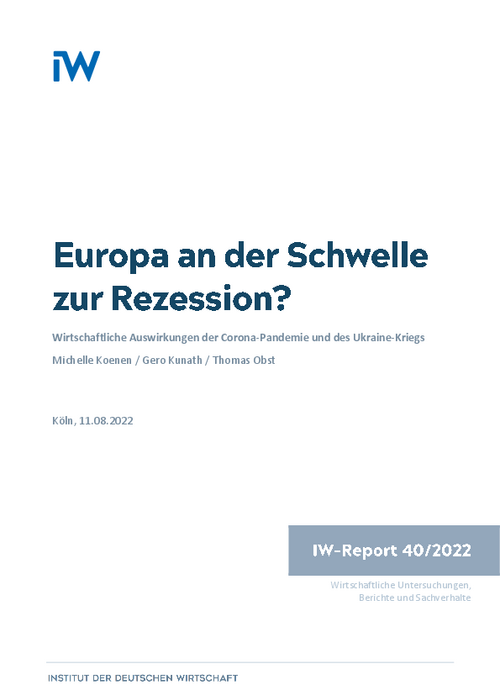The European Union is facing one of its biggest crises since the financial crisis of 2008. The pandemic started in 2020 and led to a historical economic downturn in the second quarter of that year.

Europe on the brink of recession?: Economic Impact of the Corona Pandemic and the Ukraine War

The European Union is facing one of its biggest crises since the financial crisis of 2008. The pandemic started in 2020 and led to a historical economic downturn in the second quarter of that year.
Lockdowns and border closures disrupted international supply chains and severely restrained domestic economic activity. Reduced mobility led to a slump in private consumption and high uncertainty constrained industrial production and investment activity. However, the pandemic has led to asymmetric effects in different EU member states. Whereas economic activity remains subdued in countries like Spain or Germany, investment activity, real GDP or industrial production exceeded pre-Corona levels by a margin in Poland, Lithuania, or Hungary. Germany has suffered from severe blows to its industrial base caused by lockdowns, disrupted supply chains but also the pressures coming from the energy transformation and rising energy prices starting in the middle of 2021 well before the outbreak of the war in Ukraine.
Expansionary fiscal and monetary policy employed a wider arsenal of tools to stabilize expectations, provide companies with liquidity and support households with income losses or short time work schemes. In fact, the development in labor markets shows that government policies have worked and created sufficient demand to keep people in employment. Instead of the ‘great quit’ we have seen the ‘great reshuffling’ in Europe. Despite the pandemic unemployment rates fell in all EU countries considered here. Only in Hungary it remains above the pre-crisis level. However, just when economies seem to have been recovering with supply chain pressures the unjustified Russian aggression led to a breakout of war in Ukraine amplifying negative economic effects. In general, it increases the downside economic risk and adds to inflationary pressures. An inflation shock is hitting the European countries, but it is also weakening economic activity worldwide. Most central banks have initiated restrictive monetary policies to cope with inflation rates well beyond their targets. Both higher inflation rates and restrictive monetary policy worsen the economic outlook in Europe.
The war in Ukraine brings the EU on the brink of recession. Implemented energy embargos on coal and oil as well as the ongoing reduction of gas supplies from Russia to Europe lead to high economic and geopolitical uncertainty. It has already led to a complete overhaul and rethinking of energy dependencies and supply chains. Nonetheless, there are still some cushioning factors such as robust labor markets, a possible withdrawal of excess savings accumulated during the pandemic stimulating private consumption, fiscal programs such as NextGenerationEU stabilizing investment expectations. Creating the ‘perfect storm are a cooling worldwide economy, a looming debt crisis in Europe, a scaling back of expansionary monetary and fiscal policy as well as possible production shortages and supply chain disruptions, should Russia completely cut its gas supplies to Europe.

Europe on the brink of recession?: Economic Impact of the Corona Pandemic and the Ukraine War

More on the topic
Not so Different?: Dependency of the German and Italian Industry on China Intermediate Inputs
On average the German and Italian industry display a very similar intermediate input dependence on China, whether accounting for domestic inputs or not.
IW
China’s Trade Surplus – Implications for the World and for Europe
China’s merchandise trade surplus has reached an all-time high and is likely to rise further. A key driver appears to be a policy push to further bolster Chinese domestic manufacturing production, implying the danger of significant overcapacities.
IW